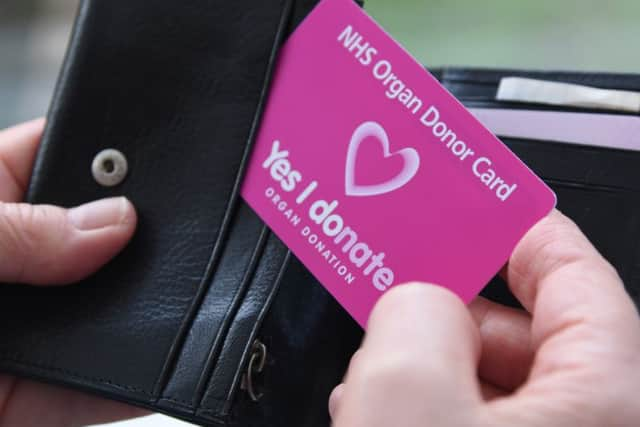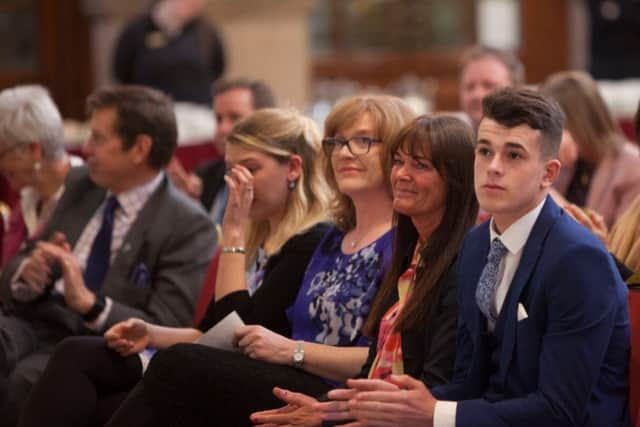We need everybody in Scotland on NHS Organ Donor Register
and live on Freeview channel 276
Mums, dads, daughters, sons and grandparents, just waiting for the chance to get on with a normal life.
Some will get the call; others will, sadly, die waiting for the phone to ring.
Advertisement
Hide AdAdvertisement
Hide AdWhich is why, during Organ Donation Week from September 3 to 9, Organ Donation Scotland is keen to stress that we all have it in us to save a life.


The organisation’s We Need Everybody campaign is urging people from across Scotland to join the NHS Organ Donor Register and give hope to those waiting for an organ transplant.
Arguably, there is already hope here in Scotland.
Our country has the highest percentage of donors on its register in the UK with just over 50 per cent, compared to 38 per cent in England.
But Lesley Logan, Organ Donation Scotland regional manager, hopes even more people will come forward.
Advertisement
Hide AdAdvertisement
Hide Ad

She said: “At the moment, there are 550 people – just like you and me, average Scots – whose lives will be shortened without a transplant.
“They are all mothers, fathers, daughters, sons and grandparents who can’t get on with their lives because they are so ill.
“Organ donation is a lasting legacy – something good that comes out of tragedy.
“It gives people comfort to know their loved one saved lives and prevented other families from going through such pain.
Advertisement
Hide AdAdvertisement
Hide Ad

“At the time, they are grieving their own loss but when they later reflect on it they are proud of what their loved one has done.
“It’s a rare thing to be able to save someone’s life but we all have it in us.
“If you have an untimely death and you no longer need your organs, do you really want to have them buried or cremated?
“You are much more likely to need a transplant than you are to become a donor.
Advertisement
Hide AdAdvertisement
Hide Ad“And if we’re prepared to take an organ to save our own or a loved one’s life, surely we should all be prepared to give our organs too?”
While Scots are often ridiculed for being miserly, we are a generous nation.
The organ donor register statistics for the UK ably back up that claim.
Lesley said: “Here in Scotland, people have already been incredibly supportive in signing up.
Advertisement
Hide AdAdvertisement
Hide Ad“We have the highest number registered in the UK and that’s been the case for more than a decade now.
“In fairness, a lot of that is down to the Scottish Government which has run successive campaigns and I think that has made a difference here.
“We also get slightly more people here, than elsewhere, saying they don’t want to be an organ donor in light of the campaigns.
“But far more people are on the register here and 80 per cent of families also support their loved one’s decision.
Advertisement
Hide AdAdvertisement
Hide Ad“Only six families per year decide not to go ahead with organ donation.
“We respect whatever decision people come to and have never had a single complaint in Scotland about approaching families for organ donation.
“We have had several, however, from families who have not been approached.”
The reason for that is simple – not everyone who dies can donate their organs.
Advertisement
Hide AdAdvertisement
Hide AdLesley explained: “There are only around 400 people a year in Scotland who are able to donate their organs.
“People have to be in intensive care in hospital, on ventilator support, to be eligible to become a donor.
“With so few every year, our donors are very special to us.
“One misconception is they all come to us from trauma – that only accounts for three per cent of cases.
“The vast majority of our donors suffer unexplained bleeds in the head.
Advertisement
Hide AdAdvertisement
Hide Ad“Improvements in health care are a wonderful thing but it also means we have fewer donors; each and every one is precious to us.”
Given the small numbers involved, organs can be used anywhere across the UK.
In Scotland last year, 102 people donated organs after their death – although many others donated tissue.
But it is imperative that, if you do sign the register, you let your family and friends know about it.
Advertisement
Hide AdAdvertisement
Hide AdLesley said: “It’s so important to make people aware of your decision.
“We had a situation not that long ago when a woman didn’t know her husband’s decision because he did it before they were married.
“We’ll inform the family of their loved one’s decision, in as gentle a way as possible.
“We ask them to support the donor’s decision and make it happen for them.
“It’s rare for families to disagree in that situation.
Advertisement
Hide AdAdvertisement
Hide Ad“But it’s so much easier if the family is aware of their loved one’s decision.
“You can see that burden of responsibility is lifted.”
Legislation has recently been introduced to the Scottish Parliament that would move Scotland to a soft opt out system.
Most adults would be deemed to have authorised donation of their organs and/or tissue if they have not opted in or out of donation.
The statistics won’t dramatically change though.
Lesley said: “It’s a measure to try to improve donation rates. It won’t magically increase the number of donors but it may give more hope to families.”
Advertisement
Hide AdAdvertisement
Hide AdBuildings across Scotland have been lighting up in green this week to help publicise Organ Donation Week.
Among them are the Kelpies in Falkirk, the Caird Hall in Dundee and the SSE Hydro and Queen Elizabeth and Golden Jubilee Hospitals in Glasgow.
Lesley added: “We’re very grateful that these iconic landmarks have agreed to support Organ Donation Week by lighting up in green for us.
“We wrote to a lot of different organisations and were delighted with the response.”
You have it in you to save a life
Advertisement
Hide AdAdvertisement
Hide AdMore than half of people in Scotland have registered to donate their organs or tissue after their death; the country continues to have the highest registration rate in the UK.
There are more than 2,724,000 Scottish residents registered on the UK Organ Donor Register – 50.4 per cent of Scotland’s population – and surveys show that around 90 per cent of people support organ donation.
Some 550 people in Scotland are currently waiting for an organ transplant which could save or transform their lives.
Through organ donation up to seven lives can be changed, even more if tissue is also donated.
Advertisement
Hide AdAdvertisement
Hide AdAll the major organs, including kidneys, heart, liver, lungs pancreas and the small bowel can be transplanted.
Discussing your organ donation decision is vital, as families are far more likely to allow donation to proceed if they know it’s what you would want.
In 2017/18 in Scotland, 469 people received a transplant; 375 proceeded using organs from deceased donors, with an additional 94 kidneys provided by living donors to either a loved one or a stranger. In 2017/18, 102 people in Scotland donated organs after their death, with many others donating tissue.
For more information, call 0300 123 2323 or visit www.organdonationscotland.org.